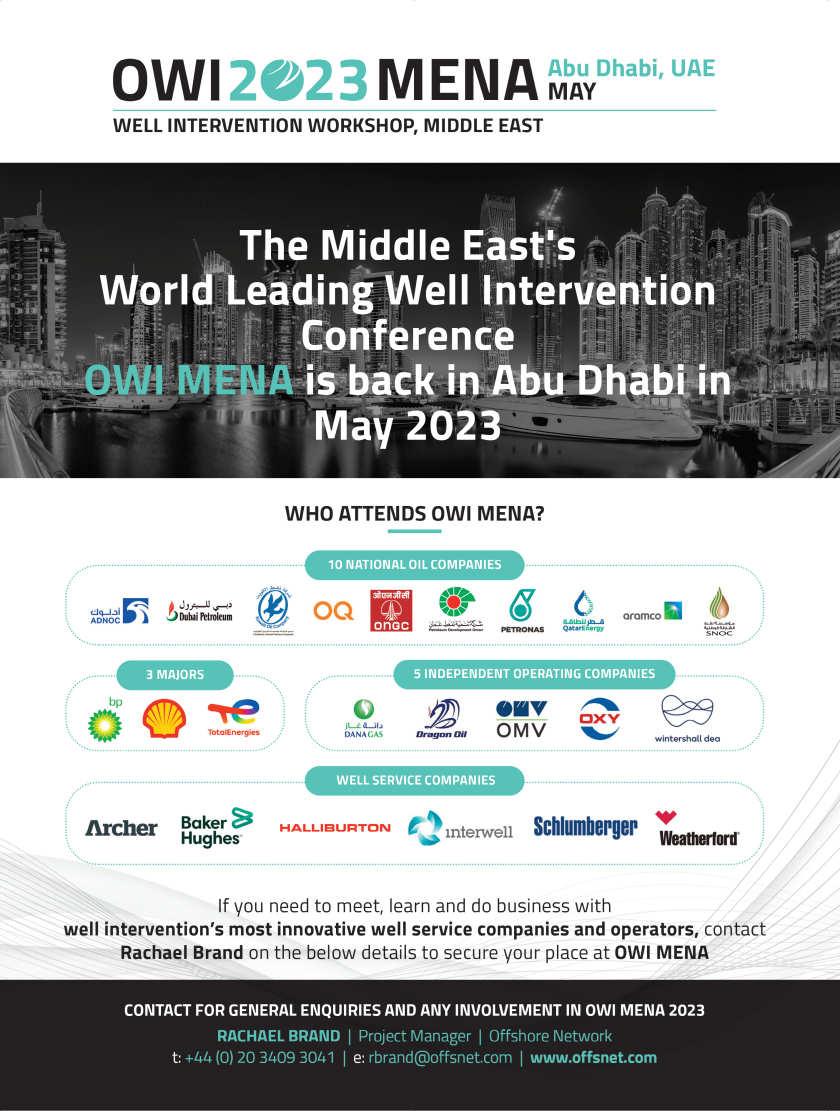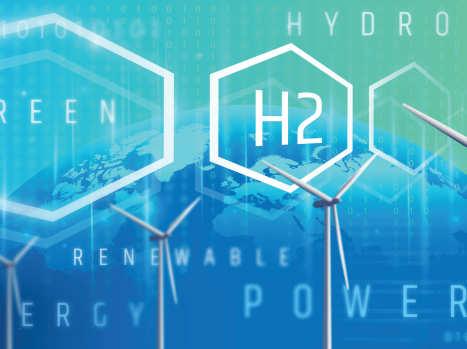
11 minute read
Connecting systems to achieve net zero objectives
Albert Devadasan, EVP – Energy & Sustainability at Yokogawa Middle East & Africa, discusses the company’s hydrogen and decarbonisation initiatives, and how it is helping companies to build smart, sustainable and resilient industrial ecosystems.
What do you think is the potential for hydrogen development in the Middle East?
We can see that global energy transition is being led by countries in the region. Environmental, Social and Governance factors are priorities by not only for Government entities, but for private industries and companies as well. Considering its significant solar energy with very high GHI (Global Horizontal Irradiance), combined with wind resources, countries in the region are aiming at increasing the share of solar and wind power in their electricity generating capacity. While all countries are working towards their net-zero goals, green hydrogen is becoming an increasingly attractive option. There is a large number of green hydrogen/ammonia projects in progress in the region, and therefore, the region is well positioned to be a major supplier of green energy to the world.
With long history and experience in the entire value chain from renewable power production to ammonia production and transportation, Yokogawa will continue to support these initiatives and supply solutions using emerging and future technologies for the development of a truly autonomous operation model.
What role is Yokogawa playing globally in hydrogen development, and are there any projects/initiatives you would like to highlight?
We have good experience working on renewable and electrolysis projects globally. As for hydrogen, in preparation for the coming of a hydrogen society, we have set up a project team that is examining the entire industry to identify the value that our company can provide throughout the hydrogen supply chain, including the production and transportation of hydrogen. Yokogawa participates in the Energy Transition Campus Amsterdam (ETCA). In addition, we participate in the Clean Fuel Ammonia Association, the Kawasaki Carbon Neutral Complex Formation Promotion Council, and the Kawasaki Port Carbon Neutral Port Formation Promotion Council in Japan.
How are you helping companies to achieve their decarbonisation objectives through carbon capture and carbon management solutions?
By cooperating with partners across multiple industries, Yokogawa is aiming to achieve net-zero CO2 emissions and contribute to the achievement of a carbon-neutral society that is one of the company’s “Three goals” for sustainability.
We have implemented our systems and services in CCUS projects in several regions. Regarding carbon neutrality, control, which is directly linked to operations, plays a major role, and the collaborative study project for the achievement of carbon neutrality at an industrial complex in the Goi district of Ichihara City in Chiba Prefecture, Japan, for example, is seen as a touchstone. We are currently conducting an inter-industry survey
Yokogawa has long experience in the hydrogen value chain.
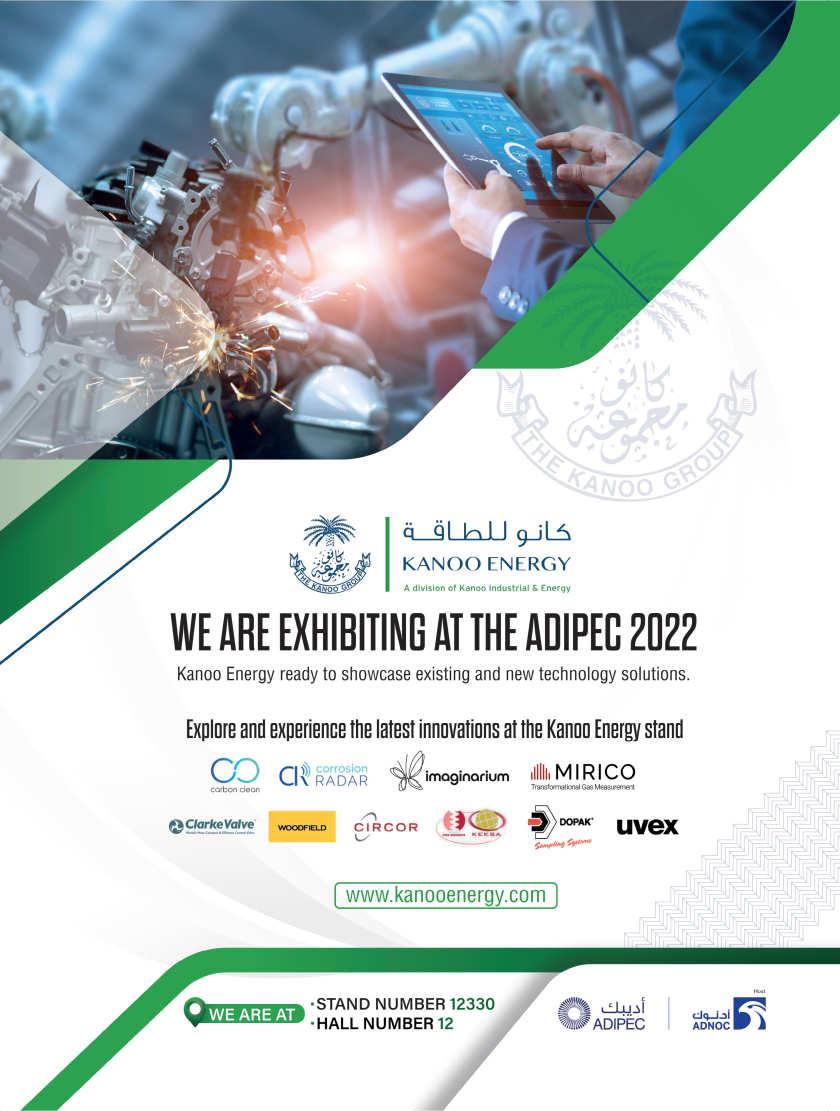
to achieve net-zero CO2 emissions from the entire complex in the district in 2050.
In the future, it is important to create an SoS (System of Systems) that looks at the entire supply chain, including production, supply, and use, within that region. To handle this properly requires not only IT know-how but also on-site knowledge of operational technology (OT). Yokogawa is well versed in the control of the process industry, and believes that our company can deliver value.
How important is digital transformation for achieving efficiency and sustainability objectives?
Our company's purpose states, "By utilising our ability to measure and connect, we fulfill our responsibilities for the future of our planet.”
“Connect” means not only connecting valuable information, but also to build trust with customers in various industries, and to further resonate value by becoming a unifying point and connecting customers and industries.
The supply stability of renewable raw materials, biomass power generation and waste heat utilisation is a challenge, and control is difficult. We will continue to help our customers decarbonise by solving this challenge, while leveraging our DX and consulting capabilities in digital twins, solutions, simulation, and AI.
We believe that the energy supply chain will become increasingly complex, shifting from centralised production to decentralisation and overall optimisation. For example, instead of being supplied with electricity by a large power plant, the system will change to combine multiple renewable energy sources and optimise them. Looking ahead to a world where society as a whole is a System of Systems (SoS) that organically connects systems and systems, Yokogawa will lead the way by leveraging its consulting and integration capabilities.
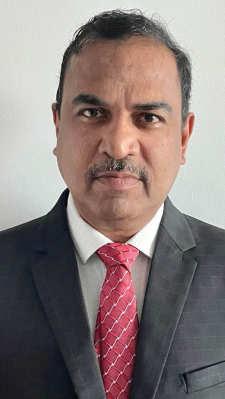
What is the focus of Yokogawa’s participation at ADIPEC, and what will you be showcasing?
The synergistic multi-disciplinary forum of global experts and decision makers that ADIPEC engages has been an ideal and impactful platform for Yokogawa.
This year, Yokogawa will be joining the Digitalisation Zone of ADIPEC 2022 that brings together energy and technology companies to build smart, sustainable, and resilient industrial ecosystems. In keeping with this emergent focus, Yokogawa, along with Group company KBC and our partner ExRobotics, will showcase Industrial Autonomy solutions which harness our IT/OT expertise to guide companies along the continuum of Industrial Automation to Industrial Autonomy (IA2IA).
You will also see a 3D model of “containerised hydrogen” in our booth, that has already gained significant attention of our customers in the region. n
Image Credit: Yokogawa Middle East & Africa.
Albert Devadasan, EVP – Energy & Sustainability at Yokogawa Middle East & Africa.
Managing data is crucial for digitalisation success
THE OIL AND gas sector faces many challenges, including upskilling the workforce, increasing capital and operational costs, a complex and ageing infrastructure, market volatility as the new norm, and growing sustainability commitments. Wherever operators are on their digital journey, Rockwell Automation has a solution at ADIPEC.
Operators can leverage technology for a safer workplace and improved productivity by utilising knowledge transfer and clear instructions with connected worker solutions, ensuring staff are trained, productive and secure.
With effective maintenance strategies using predictive maintenance to reduce costs, operators can ensure reliable operations and assets, and improve asset utilisation and availability to improve bottom-line performance. Using information solution tools to connect and optimise processes, operators can improve production and reduce inefficiency from the reservoir through to the refinery. In a volatile market, utilising digitalisation that drives automated operations allows operators to be opportunistic with scalable processes that rely less on human capital.
With sustainability emerging as a key priority across the industry, digital transformation will be vital in helping organisations unlock real value in a decarbonised future.
Crucial to all these endeavours is data. On its stand (Hall 13, Stand 13455) at ADIPEC 2022, Rockwell Automation will partner with Sensia, showcasing solutions that enable customers to decarbonise their operations in onshore and offshore production, increase their overall operational effectiveness, overcome market volatility, and meet their ESG and sustainability goals using digital transformation.

Image Credit: Adobe Stock
Data is critical for the optimisation of processes.
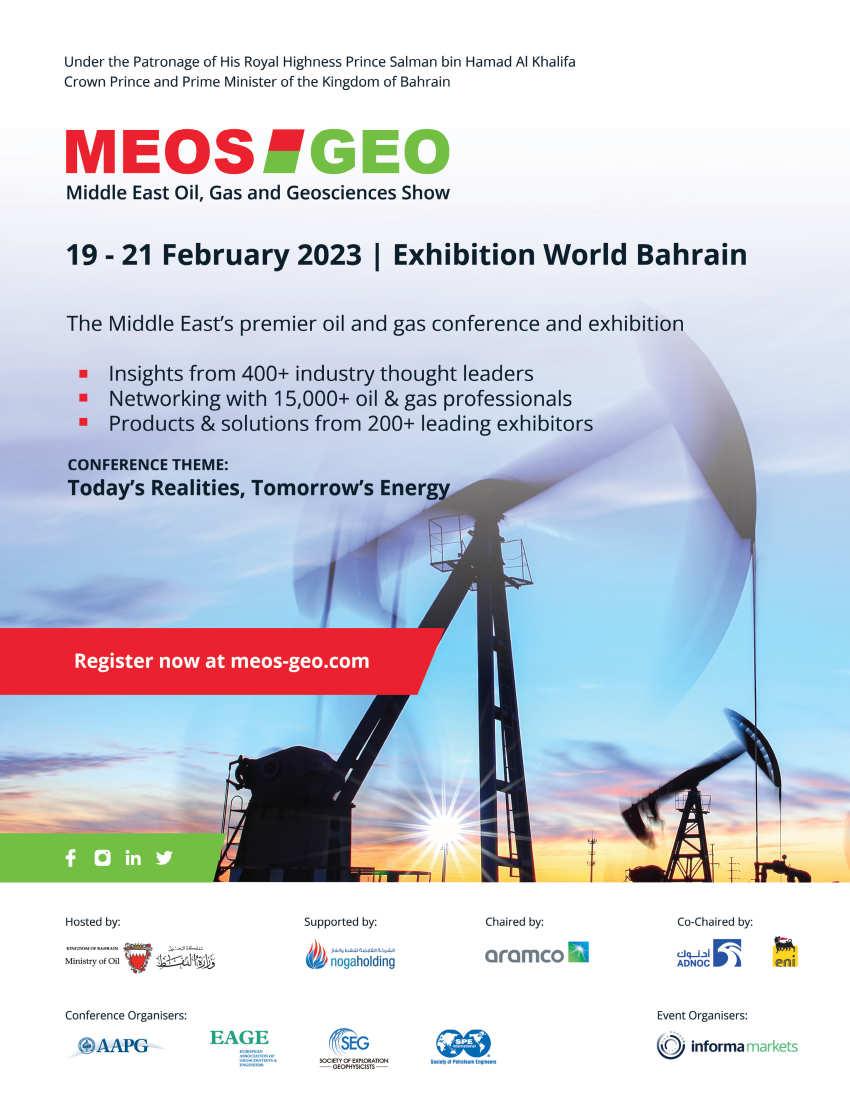
Showcasing innovative and
sustainable technology
As the countdown begins to COP28 next year in the UAE, Kanoo Energy, a division of Kanoo Industrial & Energy, will be participating in the 18th edition of ADIPEC, taking place from October 31 to November 3, 2022. Innovative solutions related to the oil, gas and petrochemical industry will be showcased.
KANOO ENERGY WILL be at the annual Abu Dhabi International Petroleum Exhibition and Conference (ADIPEC) 2022, showcasing a range of sustainable technological innovations that are accelerating the growing demand for energy transition.
Participating at Stand 12330 in Hall 12, this year the visitors will witness Kanoo Energy’s collaborative offerings divided into Industrial and Technology categories. The Technology section of the stand will display state-of-the-art technology solutions.
The Kanoo Energy stand will have for the first time a mini theatre setup to display technical presentations by participating companies. The sessions will provide enriching industry insights, challenges, and market disruptions that will be at the heart of the global dialogue on the future of energy. The stand will also amplify the achievements and futuristic direction adopted by Kanoo Energy and its partners via a giant screen.
More than 150,000 professionals and corporate representatives will be visiting over the four days of the event. Hosted by the Abu Dhabi National Oil Company (ADNOC) in the capital of the United Arab Emirates, ADIPEC is the world’s most influential meeting place where oil, gas and energy companies and professionals convene in-person, safely and securely.
Commenting on the participation, Ali Abdulla Kanoo, President of Kanoo Industrial & Energy said, “For over decades now, ADIPEC remains a very important platform and a great initiative from ADNOC. It is a great arrangement to bring together global industry leaders from around the world. With our participation at ADIPEC 2022, Kanoo Energy strengthens our commitment to align with the UAE vision to pioneer a new era of technology development in the future of energy.
“When you have initiatives such as COP27 and COP28 lining up on the world stage, coming together for ADIPEC only helps as a vital support system. For us at Kanoo Energy, it has always been about innovations through collaborations. Over the four days in Abu Dhabi, we will showcase existing and new solutions, create business opportunities as well as strengthen our relationships and network across the whole energy sector.”
Manoj Tripathy, Chief Executive Officer of Kanoo Industrial & Energy, said, “We are contributing towards building national capacities in energy technologies. This involves Kanoo Energy investing into renewable energy, gas-fired power solutions, the Internet of Things (IoT), using Artificial Intelligence in an energy production unit, 3D printing, and additive manufacturing, etc.”
The Yusuf Bin Ahmed Kanoo Group is one of the oldest & largest family-owned independent groups of companies with varied interests. Kanoo Energy, a subsidiary, was established over two decades ago and is a leading engineering service provider to core sector industries – oil & gas, power, utility, mining and construction, among others – across Saudi Arabia, UAE, Bahrain, and Oman. n
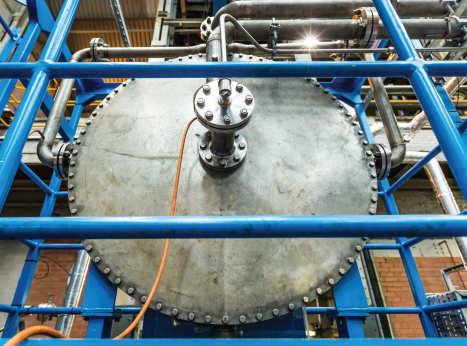
Kanoo Energy is a leading engineering service provider to core sector industries across Saudi Arabia, UAE, Bahrain and Oman.
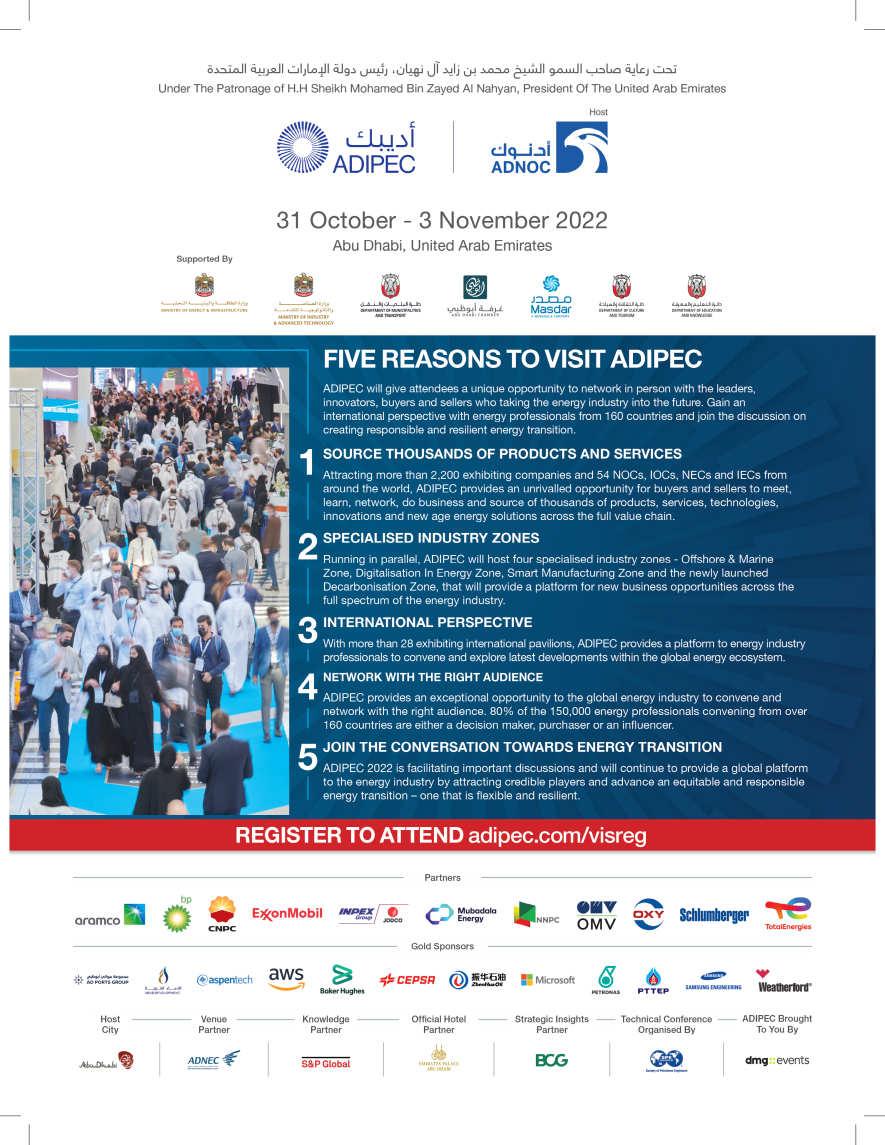
Walking to work in the Gulf
THE LAST TWO decades have seen tremendous changes in the offshore service sector. The introduction of Walk to Work (W2W) has permanently changed the nature of the global offshore energy infrastructure. In just 15 years, Ampelmann, one of the early pioneers of W2W, has grown from a small engineering start-up based in the Netherlands, to an international company with a large fleet operating in all corners of the world. Known globally for its motion compensated gangways, the company’s systems have made marked strides everywhere and see continuous use throughout the world.
Fast becoming the new industry standard, W2W has much to offer to the Gulf. As the region contains the largest offshore hydrocarbon reserves in the world, the exploration, production and maintenance of offshore assets is growing consistently with the rising demands for energy. Ampelmann’s marine based W2W solutions are costeffective and provide safe and reliable access during offshore operations, offering a powerful alternative to traditional access solutions.
Sea conditions in and around the Gulf can be surprisingly harsh at certain times of the year. During the winter months, some parts of the region frequently experience rough seas and strong winds. As motion-compensated gangways remain stable during offshore operations, they can operate throughout the year and provide safe and consistent access to offshore installations in spite of seasonal constraints. By reducing the time vessels cannot transfer personnel due to bad weather, W2W solutions extends weather windows and shortens the duration of campaigns, resulting in higher operational efficiency and year-round productivity.
W2W is ideally positioned in the Gulf as the safest and most cost-effective offshore access solution that simultaneously provides consistency and high workability. By enabling continuous access throughout the year, W2W offers significant advantages over traditional access methodologies due to the motion compensated technology that underpins it.
Ampelmann’s gangways come in many sizes and shapes and are specifically tailored to meet the evolving demands of its clients. W2W solutions provide effective operational support throughout the entire lifecycle of offshore assets. Since its first operation in the Gulf over twelve years ago, the company has successfully supported a large variety of short and long-term work scopes, ranging from general operations, such as crew change and maintenance, to installations, shutdowns and decommissioning work.
Ampelmann prides itself on its innovative spirit and is building and designing new electric systems that contribute to the development of sustainable solutions and suit the specific needs of its clients in the Middle East. The company has already begun to electrify the entire A-type fleet, which will lead to a future energy saving of 90%. Alongside the electrification of its most popular system, the company recently introduced the F-type, an electric modular system that is particularly well suited for maritime conditions such as those in the Gulf. Its 21m height-adjustable gangway allows for continuous crew change and increased operational flexibility at low cost. New electric systems, such as these, promise that W2W will remain an appealing access solution for the foreseeable future.
Deeply involved in the regional market, Ampelmann has offices in Qatar and Dubai. Its A- and L-type gangways have already transferred more than 1,200,000 people for national and international clients in Qatar, Dubai, Oman, Saudi Arabia and Azerbaijan, and more recently in Abu Dhabi. This strong regional presence allows the company to deploy and mobilise its systems at short notice, whenever and wherever they are needed. It is evident that W2W is a key area of growth for the offshore energy sector in the Gulf region. n
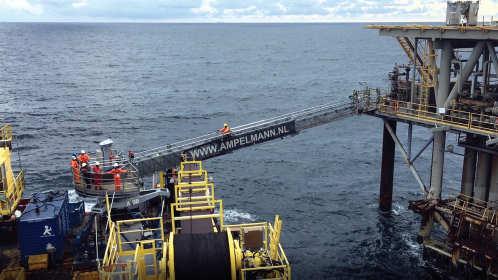
The Ampelmann A-type gangway in use.
